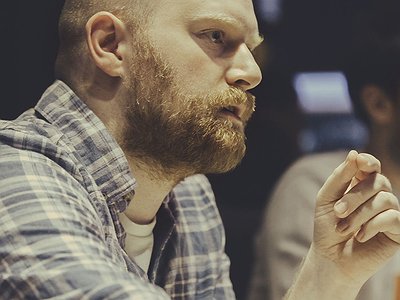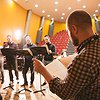Name:Daniel Elms
Nationality: British
Occupation: Composer
Current Release: Islandia out on New Amsterdam Records
Recommendation: The Somnyama Ngonyama series by Zanele Muholi
Website/Contact: To keep up with Dan’s latest releases and performances, visit his website www.danielelms.co.uk
When did you start composing - and what or who were your early passions and influences?
I started writing in my early teens, though “fumbling around the guitar” would be a more accurate description. At the time, my influences were grunge, goth and punk: I’d inherited my sister’s music collection when she left home and, in my age of rebellion, that music was a revelation. By seventeen I’d been studying the guitar formally for nearly five years and I was also studying composition, but there was always a disconnect between what I listened to, what I wrote, and what I studied. It wasn’t until my early twenties that I decided to let composition consume me and I hung up the guitar for a long time when I made that decision. At that point, there was another decade of writing, trial and error, and more studying before I felt confident in expressing myself with music and putting my name to it.
For most artists, originality is first preceded by a phase of learning and, often, emulating others. What was this like for you? How would you describe your own development as an artist and the transition towards your own voice? What is the relationship between copying, learning and your own creativity?
There’s a world of music out there. I’m curious about all of it and I can’t imagine there will ever be a point when I am satisfied with what I know — I think anyone creating anything will say something similar, be it learning from others, or learning from your own craft and processes. That said, there is a need for an artist to separate study and artistic output. If you’re always second guessing yourself in order to appease someone else’s principles, then you’re doing a disservice to your own expression. I don’t abandon what I’ve learnt in the act of creating, I just don’t let it dictate what I can do. This is partially why I refer to my music as being “post genre”: the music uses the principles and aesthetics it needs in order to say what I want it to say — the subject and expression is paramount.
What were some of the most important creative challenges when starting out as a composer and how have they changed over time?
When starting out, the biggest challenge was what we’ve just spoken about: the ability to separate artistic output and study. There is a lot of pressure and expectation to conform, particularly within music conservatoires and cliques. I suffer a lot from anxiety, so it took me years of battling my own demons before I had the confidence to go my own way — that found confidence is what can be heard in “Islandia”. Today, the main challenge I have is finding my way back from inside the rabbit hole and making time to stay healthy, both physically and mentally. I’m easily consumed by writing.
Tell us about your studio/work space, please. What were criteria when setting it up and how does this environment influence the creative process? How important, relatively speaking, are factors like mood, ergonomics, haptics and technology for you?
My studio has very little influence on my creative process. What I am saying and how I say it is what is most important in all of my work: most key elements I write away from the studio — the shower, it turns out, is a great place for writing — occasionally I will sit with a guitar, synth or piano and sketch my ideas there. When it comes to capturing a performance, or sculpting a specific electronic timbre, then I can get lost for days in synthesisers and studio equipment. The rest of the factors you mention would be nice I’m sure, but they’re not a priority for me and they have no bearing on my art.
Could you take us through a day in your life, from a possible morning routine through to your work? Do you have a fixed schedule? How do music and other aspects of your life feed back into each other - do you separate them or instead try to make them blend seamlessly?
Coffee, start work by 10am; don’t even think of reading emails until after lunch. That’s as detailed a “fixed schedule” that I’ll ever have within the working day — I don’t like micromanagement. What I do instead is give myself checkpoints to hit: a weekly list of what needs to be achieved and a daily “chunk” from that weekly list. I also have a hardback book in which I set out annual plans. These tend to change by the end of the year, but they’re a great starting point. Music is always there — anyone working freelance has their work on the brain. It can provide a massive amount of cognitive dissonance, so I add lifestyle and health to my weekly lists: you have to work just as hard at looking after yourself.
There are many descriptions of the ideal state of mind for being creative. What is it like for you? What supports this ideal state of mind and what are distractions? Are there strategies to enter into this state more easily?
It is a great feeling when you enter that state of “flow”. I used to sit around waiting for inspiration and flow to strike, but that can take weeks or months. There is, however, a guaranteed way to bring on that state of mind: show up. Show up, confront the empty page and do something — anything. Even if what you create in an entire week is unusable, it is the act of creating that is important. For anyone struggling in that area, I would recommend reading up on “subconscious processing” and giving it a go — it changed my work dramatically.
Could you take me through the process of composing on the basis of one of your pieces that's particularly dear to you, please? Where did the ideas come from, how were they transformed in your mind, what did you start with and how do you refine these beginnings into the finished work of art?
It always starts with the subject. This is often related to material that I’m reading, current social affairs, or just a state of mind. Second comes the gesture: rapid iterations of short, musical gestures that capture something of the subject. Mostly I write these in my head, but occasionally I might have an instrument — whatever feels right.
Once I’ve found a gesture that seems to resonate with the subject, I’ll take it away and extrapolate it in order to create the building blocks — the colour palette — of the piece. I use a lot of principles of 12-tone composition during this process, but I restrict the content to fewer pitches; sometimes I throw in more jazz-oriented ideas for harmonisation — whatever the piece needs. This whole process, teasing out new ideas from the original gesture, can take weeks or months, but once I have made the colour palette I keep the act of using it very fluid: capturing the movement of composing and persevering the brushstrokes.
How do you make use of technology? In terms of the feedback mechanism between technology and creativity, what do humans excel at, what do machines excel at?
Technology is great for timbral sculpting and for workflow during collaborations. But if technology is automated and not performed by a musician, it struggles with feel and the fluidity of phrasing. Programming feel and fluidity takes a long time, as it is not intuitive to most technology, specifically analogue synthesis. Both concepts do, however, come very naturally to humans, so anything I write for or with technology I write with the intention of a human hand controlling it in performance.
I don’t abide by the idea of mic’ing an orchestra to have them compete with the playback of electronics that boom through a PA. I spend a lot of time finding ways to make the technology blend with the acoustic instruments, as if it were the accepted member of the contemporary orchestra that it should be. That means reducing the volume of the electroacoustic elements and working hard to find tones that blend. I’ve lost weeks to testing out different speakers and rewiring units to get the best tones out of electroacoustic instruments — they should be treated with the same care as any acoustic instrument and that includes pursuing the ideal tone.



